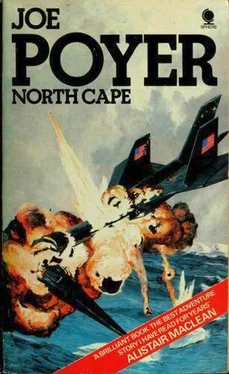McPherson, in short, was an expert on survival under the worst possible conditions and had proven it time and time again. A SEAL had been assigned to the U.S.S. Robert F. Kennedy at the request of the Secretary of the Navy, who had been far-sighted enough to realize that a SEAL’s talents might be needed at some future date. The pilots of the A-17 recon aircraft were the most valuable commodity in the world. Standing orders to the RFK, the Remote. Mission Control Point as she was known by the twenty or so men privy to her actual missions, were to get back the pilot of a downed aircraft at all costs, although McPherson was not one of those few who knew the exact nature of the missions that Teleman performed.
But even so, he continued down the beach at an easy run, heading for a point of land some eight miles west of Varangerfjord, which he and Folsom had estimated the Russians would reach by 1100. It was 1030 now, and he still had approximately two miles to go.
The wind was blowing in fiercely from the sea, driving the snow in ragged gusts, when McPherson found the point. High up on the cliffs and folded in among a series of chimneys and crags, McPherson found a cleft that was hidden from sight above and below, yet would afford him a clear view up and down the beach or at least it would have if the snow had not been so heavy. As it was, his effective seeing distance was almost nil at times.
But it was all McPherson needed. Directly below, the beach described a narrow, inward-turning arc. A small barrier of rocks, piled up by countless generations of waves, drew a dam from the base of the cliffs to the water. To negotiate the dam, a man would either have to climb up and over, which would leave him fully exposed for several minutes while he did so, or else work part way up the cliffs over a series of icy ledges. His hiding place afforded a view along the rim. The rock peaked at this point so that McPherson had a clear field of fire downhill, enabling him to control the terrain within rifleshot inland. As he sat in his well-shielded cubbyhole, he reviewed Folsom’s orders. The object of this little jaunt was to delay the advancing Russians as much as possible. By attacking them here, nearly eleven miles from the camp, then retreating as fast as possible, Folsom hoped to fool the Russians into thinking that they faced a sizable party. If it worked, the Russians already on the beach would call for reinforcements and, if everything went as it should, wait until they were landed.
Even if the Russians did not wait for the reinforcements, McPherson could make the eleven miles directly back to the camp in under half the time it would take the Russians, as they would be traveling more slowly, fearful of ambush. Teleman needed all the time for sleep that they could gain for him. For the run: or the Norwegian base he was going to require every bit of strength he had. So, in fact, were they all After nearly an hour of waiting, a flicker of movement on the beach caught McPherson’s eye. The wind, blowing laconically for the past few minutes, decided at that moment to freshen; and as the snow parted, he caught sight of three men dressed in Arctic gear, advancing toward his position, still several hundred yards away as yet. Carefully, McPherson edged first his parka hood, then his forehead over the edge of the cliff until his eyes were level with the ground. At first he saw nothing, but when he did he rather wished he had not. There was indeed a second party hiking along the top of the cliffs. There were five men, spread out in a line reaching from the edge, three hundred yards inland. The wide separation between each man was going to make it hard to keep track of them all once they dropped into the snow for cover.
McPherson shifted his attention to the three men approaching along the beach. His eyes narrowed as he studied the situation. The wind was blowing hard enough so that it should effectively cover the sound of his firing from the men along the top of the cliffs. By not revealing his position to the party advancing along the cliff tops, he might be able to damage the beach group and then get away before they could alert the others to flank him from the top. McPherson laid the carbine on the rock and sighted in on a featureless bundle of parka and boots trailing the main group on the beach by several yards. With luck he could knock him out and shift to the leadman before they realized they were being shot at. McPherson drew a deep breath and steadied the sights, then another movement caught his eye. One man was walking along the top with what appeared to be a portable radio. He was close enough to hear the report and perhaps see the muzzle flash if
McPherson fired. But he was also near enough to the edge so that he could be fired upon without the rest of the topside party noticing right away.
McPherson lifted his carbine and laid it on the shoulder of rock in front of him. He snapped the safety off and squinted down the barrel through the sights until the Russian was centered exactly. Slowly he opened both eyes and, as the man came into range, waited until he had approached to one hundred yards and slowly squeezed the trigger. The snap of the .222 cartridge was lost in the wind and snow. McPherson glanced hurriedly around to see if the others in the party on the cliffs had noticed. Apparently they had not. The soldier, shot squarely through the chest, had dropped, then slid down into a crevice. But his rifle had fallen out of his hands and slithered down onto the beach, fifty feet in front of the advancing troops. One of them scurried ahead and bent to pick it up. His shout of surprise carried clearly to McPherson and, with a sigh, he shifted the rifle to cover the men on the beach as they dropped flat and wormed quickly under cover. McPherson watched while the officer in charge ran up and examined the rifle. He stepped back quickly to examine the top of the cliff, then reached for his radio. McPherson dropped him with one shot, then followed up with a raking blast that drove the others deeper into cover.
He poked his head up for a quick look at the cliff party still approaching and unaware. A rifle shot splattered the rock above his head, and then a ragged fusillade splashed snow and ice around him. He returned the fire briefly, more to make them pull their heads in than to do any damage. At this range and in the heavy snowfall there was little likelihood of them hitting him, and his only chance lay in carefully selecting his targets, one by one. He did so and was rewarded by a thin cry and the sight of a body toppling out of the line of rocks. The volume of fire at his position increased. The Russians were quickly, but very gingerly, working their way closer to the shelter of the dam. Once they reached that point, he knew, it would be time to leave.
He opened up again with short bursts at the fleeting glimpses of uniforms below. The wind had increased sharply and, instead of working for him, was now beginning to work against him. Suddenly a flare burst almost directly over his position. McPherson forgot about the beach party and flung himself up to sight on the members of the cliff-top party, momentarily transfixed by the flare. Before they could move he pulled the trigger and swung the muzzle, traversing the line of tiny figures. At the first report they dropped into the snow, but McPherson kept up the fire steadily for several seconds. Then he sprang out of the cleft and charged inland at a diagonal, leading away from the cliffs into the trees. He had a good lead and in his white snowsuit made an impossible target to follow. Quick rounds of desultory fire followed, but none hit close enough to be seen. In less than a minute he reached the trees, slowed to a trot, and continued for half a mile until he reached an open glade.
The open area was several hundred feet across, large enough for the wind to have full play. As a result the surface toward the center was a smooth expanse of unbroken snow, while the southern end was drifted high. He thrashed out into the glade, making as deep a trail as he could. At the first line of drifts he threw himself down and kicked and thrashed for a moment, then stood up to survey his work. Even at the rate the snow was drifting this would remain for at least an hour. Satisfied, he carefully retraced his steps back to the trees on the same side of the clearing that he had entered and backtracked for several yards. A low-hanging branch gave him the opportunity to swing up and out of his trail and head deeper into the forest at a wide angle from the track he had made going in. Certain that he had both sidetracked the Russians and done as much damage as he could for now, McPherson trotted to the edge of the forest and, once out into the open, made for the edge of the cliffs and the comparatively easy going of the wind-swept rock. A couple of hours spent floundering around in the deep snow and woods should tire the Russians enough to delay them by at least four to six hours. Smiling happily to himself, he ran steadily on.
Читать дальше












